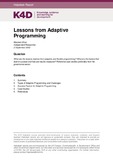Lessons from Adaptive Programming
Abstract
The aim of adaptive programming (AP) is to produce adaptive, flexible, iterative, responsive, problem-driven, politically smart, locally led programmes which are effective and efficient and meet donor requirements for accountability.
This is a rapid desk review of recent literature on AP including academic and grey sources. Section 2 covers the main challenges and barriers to successful implementation of AP. Key success factors are covered in Section 3. Selecting the appropriate monitoring and evaluation tools such as outcome harvesting or adapted versions of Value for Money to assist in measuring outcomes and embedding learning is key to successful AP, particularly in governance programmes, where results are usually long-term, non-linear and causality can be difficult to specifically trace back to the donor-funded intervention.
Section 4 details three case studies from the governance arena as this report was requested to assist in designing adaptive governance programmes. Thus, the State Accountability and Voice Initiative (SAVI) from Nigeria, Chakua Hatua from Tanzania, and Within and Without the State (WWS) from conflict regions are included to show how flexible indicators, donor communication and negotiation, empowering teams and adopting monitoring and evaluation tools assisted in successful AP outcomes in different locations and political contexts. The challenges faced and drawbacks of certain processes were fed into efficient feedback loops fostering cross-communication, adaptation, and modification to ensure procedures and policies were changed accordingly.
Sources used are primarily from the previous 5 years, as per K4D norms, unless the work is seminal, such as the ODI Report (2016) Doing Development Differently, which encouraged over 60 countries to sign up for the AP methodology. This review found a substantive body of literature on AP methodology the relative recency of academic attention on AP in the development less evidence is available on case studies of AP in the development sector, as there are not many ongoing projects and even fewer have been completed and results assessed (ICF, 2019). There is also a lack of case studies on how dynamic, empowered, innovative teams successfully apply adaptive programming ideas, particularly providing behavioural insights about such teams (Cooke, 2017) as well as little attention to precipitating and sustaining behaviour change in institutions over the longer term (Power, 2017).
Citation
Khan, M. (2022). Lessons from Adaptive Programming. K4D Helpdesk Report No 1218. Institute of Development Studies. DOI: 10.19088/K4D.2022.142DOI
10.19088/K4D.2022.142Is part of series
K4D Helpdesk Report;1218Rights holder
© Crown copyright 2022Sponsor
Foreign, Commonwealth and Development Office (FCDO)Collections
- K4D [937]

